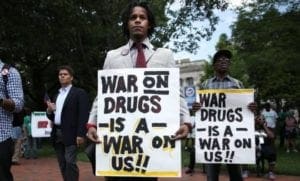What Do You Think About the War on Drugs?
This article was featured in our weekly newsletter, the Liberator Online. To receive it in your inbox, sign up here.
Me (The Libertarian Homeschooler): What do you think about the war on drugs?
 YS (Young Statesman, 14): I think it’s none of the state’s business what we can or cannot put into our bodies and what we can or cannot do with our money.
YS (Young Statesman, 14): I think it’s none of the state’s business what we can or cannot put into our bodies and what we can or cannot do with our money.
Me: But a lot of people die from drug overdoses. For whatever reason you aren’t likely to do that, but shouldn’t other people be protected from drugs and drug overdoses? Should they just be thrown to the wolves? Don’t we care about them?
YS: You’ve made a emotional argument.
Me: How do you combat that?
YS: You could say, “Are you saying it is the responsibility of the state to protect people from making bad choices?”
Me: Right. That’s the argument that the state should protect people from bad choices wrapped in a veiled personal attack: “You don’t care about other people. You’re a bad person.” But there’s another argument. Who determines what goes into your body? Who owns your body? That’s the most compelling argument.
YS: Do you own you or does the state own you?
Me: Yes. I think that’s the most important argument. Property rights. Who owns you? That can get lost. Why did it become difficult when it became about you caring about other people?
YS: Because it became an emotional argument.
Me: How did it feel when it became an emotional argument?
YS: Oh, God. Not this again.
Me: It’s a trap.
YS: It makes your brain stop working as well.
Me: What do you have to do when faced with a emotional argument?
YS: Think about the argument that’s being given to you. You have to make it about property rights again.
Me: Is that because most arguments boil down to property rights?
YS: If you’re arguing about feels, it’s because the other person is trying to shut the argument down. Most arguments are actually about property. You have to remove the emotion. You can’t follow that trail. That’s not the real argument.
Me: Is it possible that the other person doesn’t know the real argument? They don’t know what’s at stake?
YS: Yeah. They think it’s about protecting people from a small danger but there’s a bigger danger. You are trying to show them the rest of the picture. Yes, it’s important for people not to overdose but property rights are more important.
Me: The denial of property rights, in my opinion, is the greatest evil. When we deny people their property rights we have to tell lies and create systems to justify the denial. Those lies and those systems lead to violence and slaughter.

























